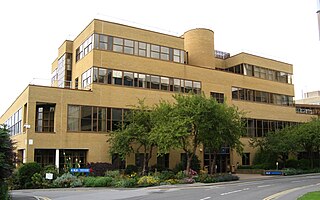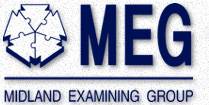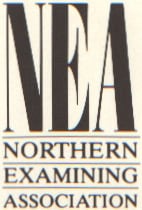The General Certificate of Secondary Education (GCSE) is an academic qualification in a particular subject, taken in England, Wales, and Northern Ireland. State schools in Scotland use the Scottish Qualifications Certificate instead. Private schools in Scotland may choose to use an alternative qualification.

The Qualifications and Curriculum Development Agency (QCDA) was a charity, and an executive non-departmental public body (NDPB) of the Department for Education. In England and Northern Ireland, the QCDA maintained and developed the National Curriculum and associated assessments, tests and examinations, advising the minister formerly known as the Secretary of State for Education on these matters.

AQA, formerly the Assessment and Qualifications Alliance, is an awarding body in England, Wales and Northern Ireland. It compiles specifications and holds examinations in various subjects at GCSE, AS and A Level and offers vocational qualifications. AQA is a registered charity and independent of the government. However, its qualifications and exam syllabi are regulated by the Government of the United Kingdom, which is the regulator for the public examinations system in England and Wales.
Edexcel is a British multinational education and examination body formed in 1996 and wholly owned by Pearson plc since 2005. It is the only privately owned examination board in the United Kingdom. Its name is a portmanteau term combining the words education and excellence.
An examination board is an organization that sets examinations, is responsible for marking them, and distributes results. Some are run by governmental entities; some are run as not-for-profit organizations.

OCR is an examination board that sets examinations and awards qualifications. It is one of England, Wales and Northern Ireland's five main examination boards.

WJEC, formerly the Welsh Joint Education Committee, is an examination board providing examinations, professional development and educational resources to schools and colleges in Wales, England and Northern Ireland under its own name and the Eduqas brand.

The International General Certificate of Secondary Education is an English language based examination similar to GCSE and is recognized in the UK as being equivalent to the GCSE for the purposes of recognizing prior attainment. It is developed by University of Cambridge International Examinations. The examination boards Edexcel and Oxford AQA also offer their own versions of International GCSEs. Students normally begin studying the syllabus at the beginning of Year 10 and take the test at the end of Year 11. However, in some international schools students can begin studying the syllabus at the beginning of Year 9 and take the test at the end of Year 10.
The Certificate of Secondary Education (CSE) was a subject specific qualification family, awarded in both academic and vocational fields in England, Wales, and Northern Ireland. CSE examinations were set in the years 1965 to 1987 inclusive. This qualification should not be confused with the Indian Certificate of Secondary Education which is the school leaving qualification in India. Also, in some African and former British colonial countries there is a qualification named the Certificate of Secondary Education based on the original and former British variant. Also, the CSE should not be confused with the African qualification CSEE.

The A Level is a subject-based qualification conferred as part of the General Certificate of Education, as well as a school leaving qualification offered by the educational bodies in the United Kingdom and the educational authorities of British Crown dependencies to students completing secondary or pre-university education. They were introduced in England and Wales in 1951 to replace the Higher School Certificate. A number of countries, including Singapore, Uganda, Kenya, Mauritius and Zimbabwe have developed qualifications with the same name as and a similar format to the British A Levels. Obtaining an A Level, or equivalent qualifications, is generally required for university entrance, with universities granting offers based on grades achieved.
The Associated Examining Board (AEB) was an examination board serving England, Wales and Northern Ireland from 1953 until 2000. It is now part of AQA.

The Office of Qualifications and Examinations Regulation (Ofqual) is a non-ministerial government department that regulates qualifications, exams and tests in England and, until May 2016, vocational qualifications in Northern Ireland. Colloquially and publicly, Ofqual is often referred to as the exam "watchdog".

The Midland Examining Group (MEG) was an examination board, operating in England, Wales and Northern Ireland. It offered a range of GCSE and Certificate of Achievement qualifications. It became part of OCR in 1998.
Examination boards in the United Kingdom are the examination boards responsible for setting and awarding secondary education level qualifications, such as GCSEs, Standard Grades, A Levels, Highers and vocational qualifications, to students in the United Kingdom.

The Joint Council for Qualifications, is a council acting as a single voice for the eight largest qualification providers in the UK offering GCSE, GCE, Scottish Highers and vocationally related qualifications: AQA, CCEA, City & Guilds, Edexcel, NCFE, OCR, SQA and WJEC. The JCQ closely monitors examination administration, invigilation of exams at individual schools and activities of exams officers.
The Joint Matriculation Board of the Universities of Manchester, Liverpool, Leeds, Sheffield and Birmingham (JMB), sometimes referred to as the Northern Universities Joint Matriculation Board, was an examination board, operating in England, Wales and Northern Ireland between 1903 and 1992. It became part of NEAB, which itself is now part of AQA.

The Southern Examining Group (SEG) was an examination board offering GCSEs in England, Wales and Northern Ireland formally established in 1987. In 1994, it was taken over by the Associated Examining Board, but kept its own identity until the AEB merged with NEAB to form AQA in 2000.

The Northern Examining Association (NEA) was an examination board offering GCSEs in England, Wales and Northern Ireland from 1985 until 1992, when it was reconstituted as NEAB.
AEB/SEG was the name used by an examination board serving England, Wales and Northern Ireland after the Associated Examining Board's takeover of the Southern Examining Group in 1994. It offered A Levels under the AEB name and GCSEs under the SEG name. AEB/SEG merged with NEAB to form AQA in 2000.
Kathleen Tattersall was a British educationalist, specialising in examination administration. She was the leader of five examination boards in the United Kingdom before becoming the first head of exams regulator Ofqual.











